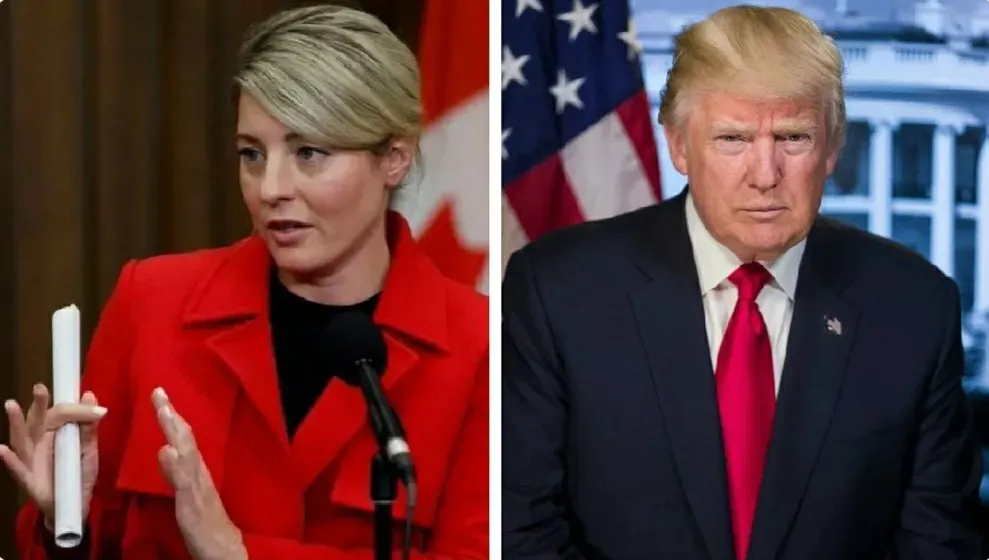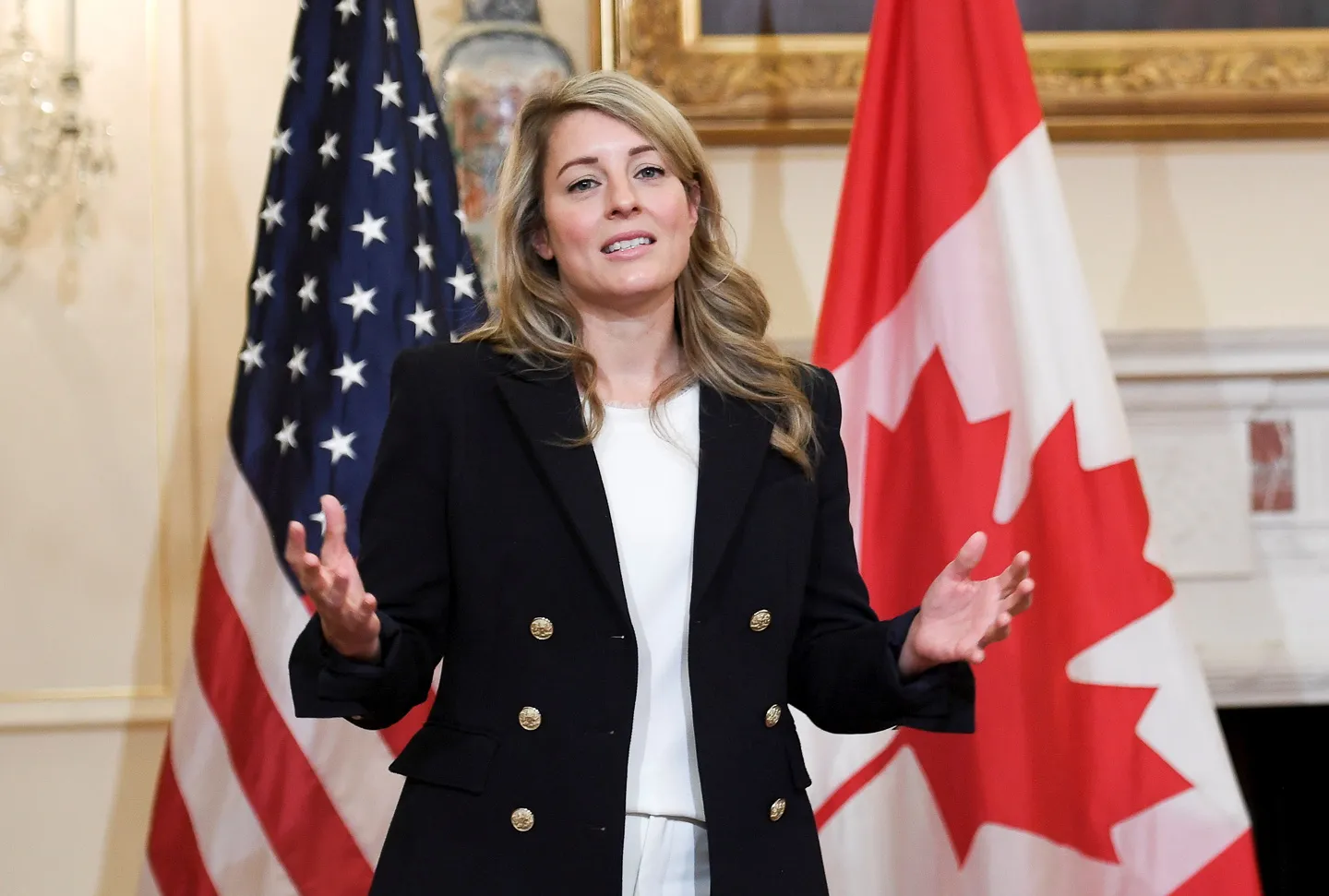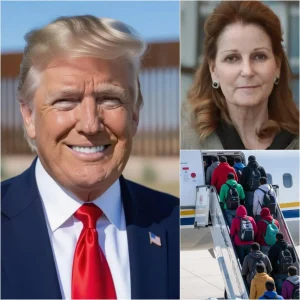Canadian FM Melanie Joly said, The relationship between the United States and Canada will never be the same again after Trump’s tariffs
In a significant and candid statement, Canadian Foreign Minister Melanie Joly declared that the longstanding relationship between the United States and Canada will “never be the same again” following the imposition of tariffs by former President Donald Trump. The statement, made during a recent interview, highlights the deep scars that the tariffs left on the diplomatic and economic ties between the two neighboring countries. Joly’s comments come as part of a broader reflection on the tumultuous period of the U.S.-Canada trade relationship during the Trump administration and the lasting consequences that it has had on Canada’s approach to its southern neighbor.

The announcement of tariffs on steel and aluminum imports from Canada, along with other trade restrictions during the Trump presidency, was a blow to the economic relationship between the two countries, which have long enjoyed a relatively stable and mutually beneficial trade partnership. Under Trump’s leadership, the United States engaged in a series of protectionist policies, often characterized by tariffs aimed at reducing the trade deficit with various countries, including Canada. These actions led to heated confrontations and raised questions about the future of the North American Free Trade Agreement (NAFTA), which was ultimately renegotiated into the United States-Mexico-Canada Agreement (USMCA).
Joly’s statement underscores the deep sense of betrayal that many in Canada felt as a result of the tariffs. For Canada, the tariffs represented a significant shift in the U.S.’s approach to its relationship with its northern neighbor. Historically, the U.S. and Canada have shared a unique bond, marked by close economic ties, cultural similarities, and shared interests in global security. The imposition of tariffs by the U.S., which were initially justified as measures to protect American industries, was viewed by many Canadians as a stark departure from the cooperative nature of the two countries’ relationship.
The tariffs imposed by the Trump administration were particularly contentious because of the close economic ties between the U.S. and Canada. Canada is one of the largest trading partners of the United States, with billions of dollars in goods and services crossing the border daily. The steel and aluminum tariffs were not just symbolic; they had a real and tangible impact on industries in both countries, particularly in Canada’s manufacturing sector. Canadian companies, which had long relied on the U.S. as a key export market, suddenly found themselves facing higher costs and barriers to access. In response, Canada imposed retaliatory tariffs on U.S. goods, further straining relations.
The trade dispute, however, was not just about economic factors. It also exposed deeper political rifts and a shift in the global political landscape. During Trump’s presidency, the U.S. pursued an “America First” agenda, which prioritized American interests at the expense of longstanding alliances and agreements. For Canada, this new approach was unsettling, as it undermined the spirit of cooperation and partnership that had defined the relationship for decades. Joly’s statement reflects a sentiment that is shared by many in Canada, who feel that the U.S. under Trump was no longer a reliable partner.
The diplomatic fallout from Trump’s tariffs was felt across the political spectrum in Canada. Canadian Prime Minister Justin Trudeau, who had initially sought to maintain a positive relationship with the U.S. under Trump, found himself navigating a difficult political environment. The tariffs created tensions within Canada’s own political landscape, as opposition parties seized on the issue to criticize the government’s handling of the situation. The impact of the tariffs also reverberated in Canadian provincial governments, with certain regions that rely heavily on trade with the U.S. bearing the brunt of the economic fallout.
While the relationship between the U.S. and Canada has begun to recover in the wake of Trump’s departure from office, Joly’s remarks serve as a reminder of the lasting effects of the tariff dispute. The implementation of the USMCA, which replaced NAFTA, was seen as a step toward mending ties, but the damage done during the tariff dispute cannot be easily undone. The new agreement, which sought to address some of the imbalances in the previous trade deal, did not fully erase the memories of the tariffs or the diplomatic tensions that accompanied them.
Looking ahead, Canada is keen to move forward with a more stable and predictable relationship with the United States. However, Joly’s comments highlight the fact that the dynamics between the two countries have fundamentally changed. The trust that was once a cornerstone of the U.S.-Canada relationship has been eroded, and while the two nations may continue to work together on key issues such as trade, security, and climate change, the scars of the Trump-era tariffs are likely to linger.
One of the most significant challenges moving forward will be how Canada navigates its relationship with the U.S. under the leadership of President Joe Biden. While Biden has taken a more conciliatory approach toward Canada, promising to work collaboratively on shared priorities, the reality is that the trust between the two countries has been tested. Canada will need to carefully manage its relationship with the U.S., balancing its economic interests with the need to assert its independence and protect its sovereignty. In many ways, the lessons learned from the Trump administration’s approach to trade and diplomacy will shape Canada’s future foreign policy.
Joly’s remarks also signal a shift in Canadian foreign policy. While the country has historically maintained a strong relationship with the U.S., there is now a growing recognition that Canada must diversify its alliances and strengthen ties with other global partners. This is particularly important in light of the shifting geopolitical landscape, where China, the European Union, and other emerging economies are becoming increasingly influential. Canada’s diplomatic strategy will likely involve a more nuanced approach to its relationship with the U.S., one that acknowledges the challenges posed by past conflicts while also seeking new opportunities for collaboration.
In conclusion, Candace Joly’s statement that the relationship between the United States and Canada will never be the same again after Trump’s tariffs is a reflection of the deep and lasting impact that those trade policies had on the bilateral ties between the two nations. The tariffs, which were a hallmark of Trump’s protectionist agenda, strained the economic and diplomatic relations that had long existed between the U.S. and Canada. While efforts to rebuild the relationship are underway, the scars of the past remain, and Canada will need to navigate its future interactions with the U.S. with caution and care. The lessons learned from the tariff dispute will continue to shape Canada’s foreign policy as it seeks to maintain its independence and safeguard its interests in an increasingly complex global landscape.






